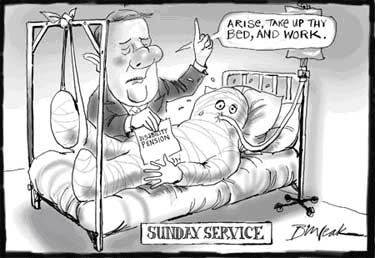| Contents > Governing for the mainstream – the manipulation of the concept of 'mainstream Australia’ by the Howard government. Where do people with disabilities fit? by Anne Wills |
| Page 1 | 2 | 3 | 4 | 5 |
The McClure Report
In response to this `situation’ the government commissioned a review of the Australian
welfare system in September 1999. The Final Report, “Participation support for a more
equitable society” -- more commonly called the McClure report, was released in August
2000.
The concept of `mutual obligation’, an aspect of both the terms of reference and the
Report itself, provides a means by which governments can seize control over this
previously `uncontrollable’ situation. This emphasis on mutual obligation has shifted
attention to the attitude of income support recipients. Poverty and unemployment result
from a failure of personal morality rather than from structural barriers to employment and
economic participation. They are, instead, the result of the failure of individual
responsibility. (Kinnear, 2002: 248) This rhetorical construction facilitates the division
between `us and them’, the `deserving and the undeserving’, the mainstream and the
disabled who fail to take individual responsibility.
Mutual obligation requirements also allow the government to `blame the victim’. Where the disabled take no responsibility for themselves, the Government will make them do so, through mutual obligation. This is the narrative where the disabled become the villains, the `mainstream taxpayers’ are the innocent victims, and the government is fighting `the good fight’ against non-mainstream people with disabilities. This narrative has a conspiratorial tone to it. Those with `lesser disabilities’ conspire to benefit at the expense of the `severely disabled’ and the `mainstream’ population. Senator Amanda Vanstone, in an interview with Alexander Kirk (2002) asked `Do (the Democrats and Labor) think Australia should pay someone who has to be in an institution or is severely disabled the same as they pay someone who's got a bad back and can work 25 hours a week?’ Similarly, Peter Dutton, also in an interview with Alexandra Kirk, (2004) argues:
-
`The disability support pension shouldn’t be seen as a way of life, of a way to opt out of work requirements, and I think the Australian taxpayer would also ask that the Government look very closely at this’.
The effectiveness of government rhetoric is indicated by the fact that the concept of mutual obligation, as it applies to welfare policy, has attained `motherhood’ status, and as such is accepted, generally uncritically, as a reasonable basis for social security policy.
(Kinnear, 2002: 249) As a consequence, the concept of mutual obligation further constricts the boundaries within which those who would argue for a better policy can operate: to criticise the concept of mutual obligation itself is deemed to be a step too far. However, it is clear that the notion of mutual obligation relies `on the belief that a selected group of social security recipients are not trying sufficiently hard to be self-reliant and, when left to their own devices, will ‘free-ride’ on the backs of the rest of the community.’ (Kinnear, 2002: 249) This use of `mutual obligation’ propaganda absolves the government of any need to consider the needs of the disabled when developing policy.

Figure 1. Mutual obligation. Leak, 2005
The Horror Story
The government has invoked the `horror story’ to represent the universe of cases, and to build support for changing the policy based on that atypical and distorted story. The highly distorted, atypical story used by the Federal government in this case is that of Mamdouh Habib. National Party MP, De-Anne Kelly used reports that the then alleged al-Qaeda fighter, Mamdouh Habib was receiving the pension, to indicate the need for a change. In 2002, She stated that
-
"It's a very graphic example of how easy it is to get on it when quite plainly you, if reports can be believed, are able to fight a war with al-Qaeda,"
"I have to say that doesn't sound like someone who's profoundly disabled."
"I really think the question needs to be asked, who in Australia can't get on a disability support pension, if these reports are true".
The government has incorporated its fear campaign based around terrorism, into the narrative in its attempt to discredit disability support pensioners. Having established a link between those receiving disability support pensions and terrorism, no matter how tenuous, the government has left opponents to its policy potentially open to accusations of supporting terrorism. It has also played on the community’s fear, and reinforced the idea that disability support pensioners are undeservedly using the hard earned money of `mainstream’ taxpayers, to their advantage at best at the expense of, or at worst to the harm of that same mainstream. By introducing Mamdouh Habib into the narrative, the Government has sought to further alienate the disabled, hoping to smooth their path to stripping them of any entitlement to the pension.
| Page 1 | 2 | 3 | 4 | 5 |
| Contents > Governing for the mainstream – the manipulation of the concept of 'mainstream Australia’ by the Howard government. Where do people with disabilities fit? by Anne Wills |
